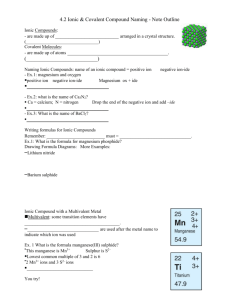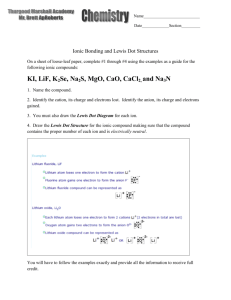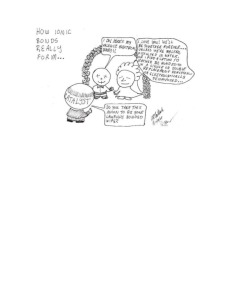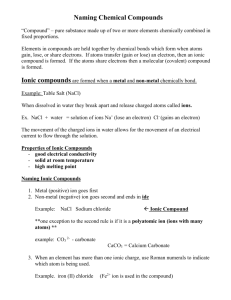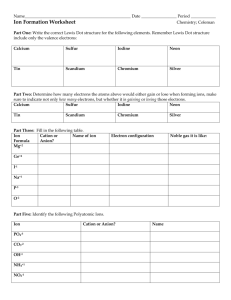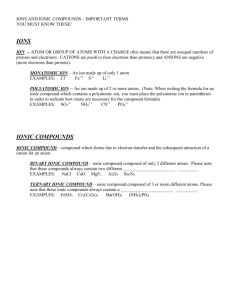Chapter 9 Review “Chemical Names and Formulas”
advertisement
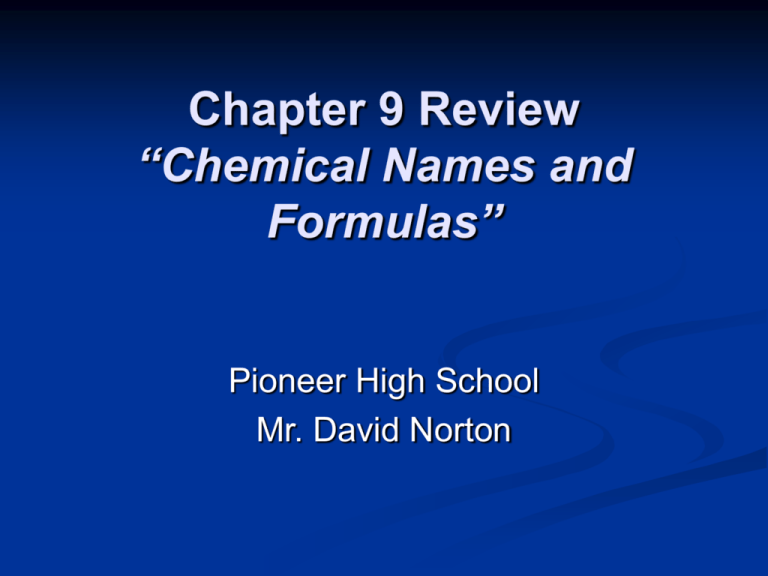
Chapter 9 Review “Chemical Names and Formulas” Pioneer High School Mr. David Norton Chapter 9 Review In which of the following are the symbol and name for the ion given correctly: a) Fe2+: ferrous ion; Fe3+: ferric ion, or b) Sn2+: stannic ion; Sn4+: stannous ion? Which of the following compounds contains the Mn3+ ion: a) MnS, or b) Mn2O3? Chapter 9 Review What determines that an element is a metal? Suppose you encounter a chemical formula with H as the cation. What do you know about this compound? Binary molecular compounds are made of two ____. Molecular compounds are usually composed of ____. Chapter 9 Review Which element, when combined with fluorine, would most likely form an ionic compound: a) lithium, or b) chlorine? What is the name for Sn3(PO4)2? What is the name of H2SO3(aq)? Which of the following is the correct element name, ion symbol, and ion name: a) fluorine, F1+, fluoride ion, or b) copper, Cu1+, cuprous ion? Chapter 9 Review What is the correct name for the N3- ion? Which of the following represents an ionic compound: a) BaI2, or b) PCl3? What is the ending for the names of all binary compounds, both ionic and molecular? What is the correct name of N2O5? Chapter 9 Review Which of the following formulas represents a molecular compound: a) ZnO, or b) SO2? When Group 2A elements form ions, they ____. What is the correct formula for calcium dihydrogen phosphate? Which shows both the correct formula and acid name: a) HI(aq), iodic acid, or b) H3PO4(aq), phosphoric acid? Chapter 9 Review When naming a transition metal ion that can have more than one common ionic charge, the numerical value of the charge is indicated by a ____. Which of the following correctly shows a prefix used in naming binary molecular compounds with its corresponding number: a) nona-, 9, or b) hexa-, 8? Chapter 9 Review What is the formula for phosphoric acid? In any chemical compound, the elements are always combined in the same proportion by ____. The nonmetals in Groups 6A and 7A have numerical charges that are found by ____. Chapter 9 Review Which of the following correctly provides the names and formulas of polyatomic ions: a) carbonate: HCO31-; bicarbonate: CO32-, or b) chromate: CrO42-; dichromate: Cr2O72-? What is the correct formula for barium chlorate? Chapter 9 Review What is the formula for sulfurous acid? What is the formula for hydrosulfuric acid? What is true about the composition of ionic compounds? When naming acids, the prefix hydro- is used when the name of the acid anion ends in ____. Chapter 9 Review When dissolved in water, acids produce ____. Why are systematic names preferred over common names? In which of the following are the symbol and name for the ion given correctly: a) OH1-: hydroxide; O2-: oxide, or b) PO33-: phosphate; PO43-: phosphite? Chapter 9 Review What is the correct formula for sulfur hexafluoride? How are chemical formulas of binary ionic compounds generally written? What is produced when a base is dissolved in water? An –ate or –ite at the end of a compound name usually indicates that the compound contains ____. Chapter 9 Review How are bases named? In naming a binary molecular compound, the number of atoms of each element present in the molecule is indicated by ____. What type of compound is CuSO4? When the name of an anion that is part of an acid ends in –ite, the acid name includes the suffix ____. Chapter 9 Review Sulfur hexafluoride is an example of a ____ compound. Which of the following is a binary molecular compound: a) AgI, or b) PCl5? Aluminum is a Group 3A metal. Which ion does Al typically form: a) Al3-, or b) Al3+? Chapter 9 Review What type of ions have names ending in –ide? Determine the subscript for ammonium in the chemical formula for ammonium dichromate. How many iron (II) ions combine with oxygen to form iron (II) oxide? What is the charge of a chloride ion? Chapter 9 Review What is the charge on the cation in CuSO4? What is the ionic charge on the zirconium ion in the ionic compound zirconium oxide, ZrO2? What is the charge on the polyatomic ions nitrite and chlorite? Chapter 9 Review
